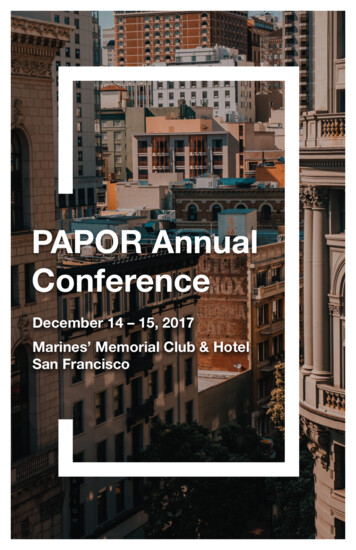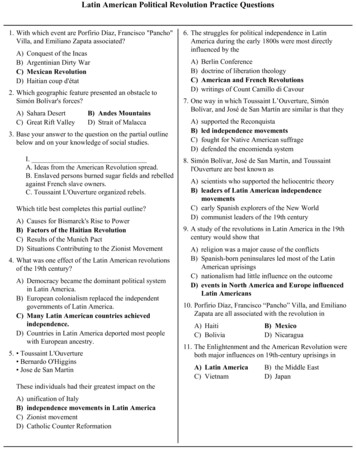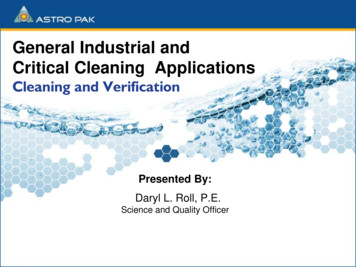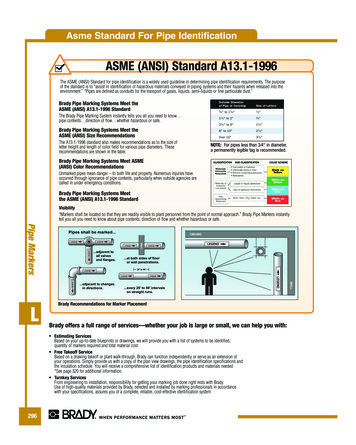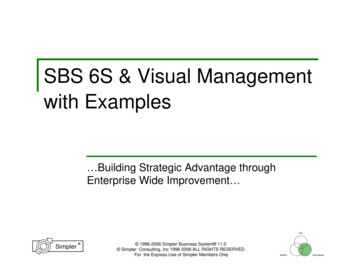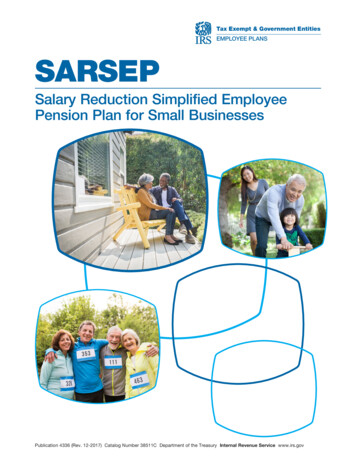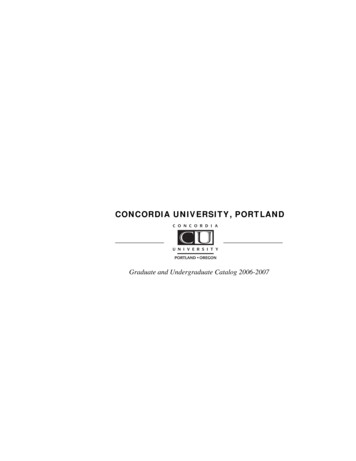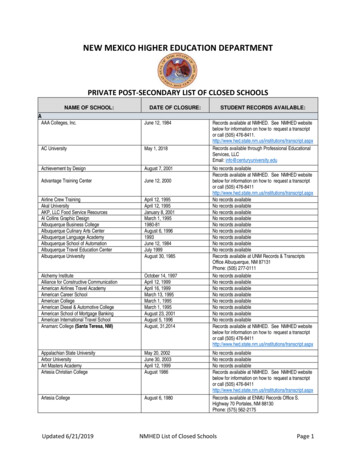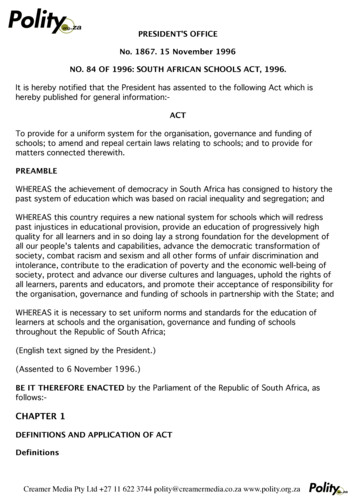
Transcription
PRESIDENT'S OFFICENo. 1867. 15 November 1996NO. 84 OF 1996: SOUTH AFRICAN SCHOOLS ACT, 1996.It is hereby notified that the President has assented to the following Act which ishereby published for general information:ACTTo provide for a uniform system for the organisation, governance and funding ofschools; to amend and repeal certain laws relating to schools; and to provide formatters connected therewith.PREAMBLEWHEREAS the achievement of democracy in South Africa has consigned to history thepast system of education which was based on racial inequality and segregation; andWHEREAS this country requires a new national system for schools which will redresspast injustices in educational provision, provide an education of progressively highquality for all learners and in so doing lay a strong foundation for the development ofall our people's talents and capabilities, advance the democratic transformation ofsociety, combat racism and sexism and all other forms of unfair discrimination andintolerance, contribute to the eradication of poverty and the economic well-being ofsociety, protect and advance our diverse cultures and languages, uphold the rights ofall learners, parents and educators, and promote their acceptance of responsibility forthe organisation, governance and funding of schools in partnership with the State; andWHEREAS it is necessary to set uniform norms and standards for the education oflearners at schools and the organisation, governance and funding of schoolsthroughout the Republic of South Africa;(English text signed by the President.)(Assented to 6 November 1996.)BE IT THEREFORE ENACTED by the Parliament of the Republic of South Africa, asfollows:-CHAPTER 1DEFINITIONS AND APPLICATION OF ACTDefinitionsCreamer Media Pty Ltd 27 11 622 3744 polity@creamermedia.co.za www.polity.org.za
1. In this Act, unless the context indicates otherwise(i) "Constitution" means the Constitution of the Republic of South Africa, 1993 (ActNo. 200 of 1993);(ii) "Council of Education Ministers" means the Council of Education Ministersestablished by the National Education Policy Act, 1996 (Act No. 27 of 1996); (xix)(iii) "education department" means the department established by section 7(2) of thePublic Service Act, 1994 (Proclamation No. 103 of 1994), which is responsible foreducation in a province; (xi)(iv) "educator" means an educator as defined in the Educators Employment Act, 1994(Proclamation No. 138 of 1994); (xiii)(v) "governing body" means a governing body contemplated in section 16(1); (ii)(vi) "grade" means that part of an educational programme which a learner maycomplete in one school year, or any other education programme which the Member ofthe Executive Council may deem to be equivalent thereto; (iv)(vii) "Head of Department" means the head of an education department; (iii)(viii) "independent school" means a school registered or deemed to be registered interms of section 46; (x)(ix) "learner" means any person receiving education or obliged to receive education interms of this Act; (vii)(x) "member of staff" means a person employed at a school; (xiv)(xi) "Member of the Executive Council" means the Member of the Executive Council of aprovince who is responsible for education in that province; (viii)(xii) "Minister" means the Minister of Education; (ix)(xiii) "officer" means an employee of an education department appointed in terms ofthe Educators Employment Act, 1994 (Proclamation No. 138 of 1994), or the PublicService Act, 1994 (Proclamation No. 103 of 1994); (i)(xiv) "parent" means(a) the parent or guardian of a learner;(b) the person legally entitled to custody of a learner; or
(c) the person who undertakes to fulfil the obligations of a person referred to inparagraphs (a) and (b) towards the learner's education at school; (xiv)(xv) "principal" means an educator appointed or acting as the head of a school; (xvi)(xvi) "province" means a province established by section 124 of the Constitution;(xviii)(xvii) "provincial legislature" means a provincial legislature contemplated in section125 of the Constitution; (xvii)(xviii) "public school" means a school contemplated in Chapter 3; (xii)(xix) "school" means a public school or an independent school which enrols learners inone or more grades between grade zero and grade twelve; (xx)(xx) "this Act" means this Act and all regulations promulgated under this Act. (vi)Application of Act2. (1) This Act applies to school education in the Republic of South Africa.(2) A Member of the Executive Council and a Head of Department must exercise anypower conferred upon them by or under this Act, after taking full account of theapplicable policy determined in terms of the National Education Policy Act, 1996 (ActNo. 27 of 1996).(3) Nothing in this Act prevents a provincial legislature from enacting legislation forschool education in a province in accordance with the Constitution.CHAPTER 2LEARNERSCompulsory attendance3. (1) Subject to this Act and any applicable provincial law, every parent must causeevery learner for whom he or she is responsible to attend a school from the first schoolday of the year in which such learner reaches the age of seven years until the lastschool day of the year in which such learner reaches the age of fifteen years or theninth grade, whichever occurs first.(2) The Minister must, by notice in the Government Gazette, determine the ages ofcompulsory attendance at school for learners with special education needs.(3) Every Member of the Executive Council must ensure that there are enough school
places so that every child who lives in his or her province can attend school as requiredby subsections (1) and (2).(4) If a Member of the Executive Council cannot comply with subsection (3) because ofa lack of capacity existing at the date of commencement of this Act, he or she musttake steps to remedy any such lack of capacity as soon as possible and must make anannual report to the Minister on the progress achieved in doing so.(5) If a learner who is subject to compulsory attendance in terms of subsection (1) isnot enrolled at or fails to attend a school, the Head of Department may(a) investigate the circumstances of the learner's absence from school;(b) take appropriate measures to remedy the situation; and(c) failing such a remedy, issue a written notice to the parent of the learner requiringcompliance with subsection (1).(6) Subject to this Act and any other applicable law(a) any parent who, without just cause and after a written notice from the Head ofDepartment, fails to comply with subsection (1), is guilty of an offence and liable onconviction to a fine or to imprisonment for a period not exceeding six months; or(b) any other person who, without just cause, prevents a learner who is subject tocompulsory attendance from attending a school, is guilty of an offence and liable onconviction to a fine or to imprisonment for a period not exceeding six months.Exemption from compulsory attendance4. (1) A Head of Department may exempt a learner entirely, partially or conditionallyfrom compulsory school attendance if it is in the best interests of the learner.(2) Every Head of Department must maintain a register of all learners exempted fromcompulsory school attendance.Admission to public schools5. (1) A public school must admit learners and serve their educational requirementswithout unfairly discriminating in any way.(2) The governing body of a public school may not administer any test related to theadmission of a learner to a public school, or direct or authorise the principal of theschool or any other person to administer such test.(3) No learner may be refused admission to a public school on the grounds that his orher parent-
(a) is unable to pay or has not paid the school fees determined by the governing bodyunder section 39;(b) does not subscribe to the mission statement of the school; or(c) has refused to enter into a contract in terms of which the parent waives any claimfor damages arising out of the education of the learner.(4) The Minister may by notice in the Government Gazette, after consultation with theCouncil of Education Ministers, determine age requirements for the admission oflearners to a school or different grades at a school.(5) Subject to this Act and any applicable provincial law, the admission policy of apublic school is determined by the governing body of such school.(6) In determining the placement of a learner with special education needs, the Head ofDepartment and principal must take into account the fights and wishes of the parentsof such learner.(7) An application for the admission of a learner to a public school must be made tothe education department in a manner determined by the Head of Department.(8) If an application in terms of subsection (7) is refused, the Head of Departmentmust inform the parent in writing of such refusal and the reason therefor.(9) Any learner or parent of a learner who has been refused admission to a publicschool may appeal against the decision to the Member of the Executive Council.Language policy of public schools6. (1) Subject to the Constitution and this Act, the Minister may, by notice in theGovernment Gazette, after consultation with the Council of Education Ministers,determine norms and standards for language policy in public schools.(2) The governing body of a public school may determine the language policy of theschool subject to the Constitution, this Act and any applicable provincial law.(3) No form of racial discrimination may be practised in implementing policydetermined under this section.(4) A recognised Sign Language has the status of an official language for purposes oflearning at a public school.Freedom of conscience and religion at public schools
7. Subject to the Constitution and any applicable provincial law, religious observancesmay be conducted at a public school under rules issued by the governing body if suchobservances are conducted on an equitable basis and attendance at them by learnersand members of staff is free and voluntary.Code of conduct8. (1) Subject to any applicable provincial law, a governing body of a public schoolmust adopt a code of conduct for the learners after consultation with the learners,parents and educators of the school.(2) A code of conduct referred to in subsection (1) must be aimed at establishing adisciplined and purposeful school environment, dedicated to the improvement andmaintenance of the quality of the learning process.(3) The Minister may, after consultation with the Council of Education Ministers,determine guidelines for the consideration of governing bodies in adopting a code ofconduct for learners.(4) Nothing contained in this Act exempts a learner from the obligation to comply withthe code of conduct of the school attended by such learner.(5) A code of conduct must contain provisions of due process safeguarding theinterests of the learner and any other party involved in disciplinary proceedings.Suspension and expulsion from public school9. (1) Subject to this Act and any applicable provincial law, the governing body of apublic school may, after a fair hearing, suspend a learner from attending the school(a) as a correctional measure for a period not longer than one week; or(b) pending a decision as to whether the learner is to be expelled from the school bythe Head of Department.(2) Subject to any applicable provincial law, a learner at a public school may beexpelled only(a) by the Head of Department; and(b) if found guilty of serious misconduct after a fair hearing.(3) The Member of the Executive Council must determine by notice in the ProvincialGazette(a) the behaviour by a learner at a public school which may constitute seriousmisconduct;
(b) disciplinary proceedings to be followed in such cases;(c) provisions of due process safeguarding the interests of the learner and any otherparty involved in disciplinary proceedings.(4) A learner or the parent of a learner who has been expelled from a public school mayappeal against the decision of the Head of Department to the Member of the ExecutiveCouncil.(5) If a learner who is subject to compulsory attendance in terms of section 3(1) isexpelled from a public school, the Head of Department must make an alternativearrangement for his or her placement at a public school.Prohibition of corporal punishment10. (1) No person may administer corporal punishment at a school to a learner.(2) Any person who contravenes subsection (1) is guilty of an offence and liable onconviction to a sentence which could be imposed for assault.Representative council of learners11. (1) A representative council of learners at the school must be established at everypublic school enrolling learners in the eighth grade and higher.(2) A Member of the Executive Council may, by notice in the Provincial Gazette,determine guidelines for the establishment, election and functions of representativecouncils of learners.(3) The Member of the Executive Council may, by notice in the Provincial Gazette,exempt a public school for learners with special education needs from complying withsubsection (1) if it is not practically possible for a representative council of learners tobe established at the school.CHAPTER 3PUBLIC SCHOOLSProvision of public schools12. (1) The Member of the Executive Council must provide public schools for theeducation of learners out of funds appropriated for this purpose by the provinciallegislature.(2) The provision of public schools referred to in subsection (1) may include theprovision of hostels for the residential accommodation of learners.
(3) A public school may be an ordinary public school or a public school for learnerswith special education needs.(4) The Member of the Executive Council must, where reasonably practicable, provideeducation for learners with special education needs at ordinary public schools andprovide relevant educational support services for such learners.(5) The Member of the Executive Council must take all reasonable measures to ensurethat the physical facilities at public schools are accessible to disabled persons.(6) Nothing in this Act prohibits the provision of gender-specific public schools.Public schools on State property13. (1) In this section, immovable property owned by the State includes immovableproperty held in trust on behalf of a tribe by a trust created by statute.(2) Subject to section 20(1)(k), a public school which occupies immovable propertyowned by the State has the right, for the duration of the school's existence, to occupyand use the immovable property for the benefit of the school for educational purposesat or in connection with the school.(3) The right referred to in subsection (2) may only be restricted(a) by the Member of the Executive Council; and(b) if the immovable property is not utilised by the school in the interests of education.(4) The Member of the Executive Council may not act under subsection (3) unless he orshe has(a) informed the governing body of the school of his or her intention so to act and thereasons therefor;(b) granted the governing body of the school a reasonable opportunity to makerepresentations to him or her in relation to such action;(c) duly considered any such representations received.(5) The right contemplated in subsection (2) is enforceable against any successor intitle to the owner of the immovable property in question.(6) No immovable property owned by the State and occupied by a public school maybe alienated unless an agreement contemplated in section 14 has been concludedbetween the Member of the Executive Council and the prospective owner of theimmovable property.
(7) The registrar of any deeds registry may not execute, attest to or register a transferdeed in respect of the immovable property in question unless the owner has providedthe registrar with proof of the agreement contemplated in subsection (6).(8) The provisions of the Deeds Registries Act, 1937 (Act No. 47 of 1937), do notapply to the right contemplated in subsection (2).Public schools on private property14. (1) Subject to the Constitution and this Act, a public school may be provided onprivate property only in terms of an agreement between the Member of the ExecutiveCouncil and the owner of the private property.(2) An agreement contemplated in subsection (1) must be consistent with this Act andin particular must provide for(a) the provision of education and the performance of the normal functions of a publicschool;(b) governance of the school, including the relationship between the governing body ofthe school and the owner;(c) access by all interested parties to the property on which the school stands;(d) security of occupation and use of the property by the school;(e) maintenance and improvement of the school buildings and the property on whichthe school stands and the supply of necessary services;(f) protection of the owner's rights in respect of the property occupied, affected orused by the school.(3) The provisions of the Deeds Registries Act, 1937 (Act No. 47 of 1937), do notapply to a real right, excluding ownership, acquired by the State, a public school oranother party in terms of an agreement contemplated in this section.(4) The right contemplated in subsection (3) is enforceable against any successor intitle to the owner of the immovable property in question.(5) Despite subsection (3), a registrar of a deeds registry must endorse on the titledeed of the affected property that the property is subject to an agreementcontemplated in this section, if the registrar receives(a) an application for such endorsement by the owner of the property, or the Memberof the Executive Council or any other holder of a right contemplated in subsection (3),together with the title deed of the property; and
(b) affidavits by the owner of the property and the Member of the Executive Councilstating that an agreement contemplated in this section has been concluded.(6) The Minister must, after consultation with the Council of Education Ministers, makeregulations regarding the minimum requirements of an agreement contemplated in thissection.(7) Any transfer duty, stamp duty, fees or costs payable in respect of the registrationof a right in terms of subsection (3) may be paid in full or in part from fundsappropriated by the provincial legislature for that purpose, but the public schoolcontemplated in subsection (1) is not responsible for such duties, fees or costs.Status of public schools15. Every public school is a juristic person, with legal capacity to perform its functionsin terms of this Act.Governance and professional management of public schools16. (1) Subject to this Act, the governance of every public school is vested in itsgoverning body.(2) A governing body stands in a position of trust towards the school.(3) Subject to this Act and any applicable provincial law, the professional managementof a public school must be undertaken by the principal under the authority of the Headof Department.Governing body serving two or more schools17. (1) The Member of the Executive Council may determine that the governance oftwo or more public schools must vest in a single governing body if it is in the bestinterests of education at the schools in question.(2) The Member of the Executive Council may not act under subsection (1) unless he orshe has(a) given notice in the Provincial Gazette of his or her intention so to act;(b) given interested parties an opportunity to make written submissions within a periodof not less than 30 days; and(c) considered all such submissions.Constitution of governing body
18. (1) Subject to this Act and any applicable provincial law, the governing body of apublic school must function in terms of a constitution which complies with minimumrequirements determined by the Member of the Executive Council by notice in theProvincial Gazette.(2) A constitution contemplated in subsection (1) must provide for(a) a meeting of the governing body at least once every school term;(b) meetings of the governing body with parents, learners, educators and other staff atthe school, respectively, at least once a year;(c) recording and keeping of minutes of governing body meetings;(d) making available such minutes for inspection by the Head of Department; and(e) rendering a report on its activities to parents, learners, educators and other staff ofthe school at least once a year.(3) The governing body must submit a copy of its constitution to the Head ofDepartment within 90 days of its election.Enhancement of capacity of governing bodies19. (1) Out of funds appropriated for this purpose by the provincial legislature, theHead of Department must establish a programme to(a) provide introductory training for newly elected governing bodies to enable them toperform their functions; and(b) provide continuing training to governing bodies to promote the effectiveperformance of their functions or to enable them to assume additional functions.(2) The Head of Department must ensure that principals and other officers of theeducation department render all necessary assistance to governing bodies in theperformance of their functions in terms of this Act.Functions of all governing bodies20. (1) Subject to this Act, the governing body of a public school must(a) promote the best interests of the school and strive to ensure its developmentthrough the provision of quality education for all learners at the school;(b) adopt a constitution;(c) develop the mission statement of the school;
(d) adopt a code of conduct for learners at the school;(e) support the principal, educators and other staff of the school in the performance oftheir professional functions;(f) determine times of the school day consistent with any applicable conditions ofemployment of staff at the school;(g) administer and control the school's property, and buildings and grounds occupiedby the school, including school hostels, if applicable;(h) encourage parents, learners, educators and other staff at the school to rendervoluntary services to the school;(i) recommend to the Head of Department the appointment of educators at the school,subject to the Educators Employment Act, 1994 (Proclamation No. 138 of 1994), andthe Labour Relations Act, 1995 (Act No. 66 of 1995);(j) recommend to the Head of Department the appointment of non-educator staff atthe school, subject to the Public Service Act, 1994 (Proclamation No. 103 of 1994),and the Labour Relations Act, 1995 (Act No. 66 of 1995);(k) at the request of the Head of Department, allow the reasonable use under fairconditions of the facilities of the school for educational programmes not conducted bythe school;(l) discharge all other functions imposed upon the governing body by or under this Act;and(m) discharge other functions consistent with this Act as determined by the Minister bynotice in the Government Gazette, or by the Member of the Executive Council by noticein the Provincial Gazette.(2) The governing body may allow the reasonable use of the facilities of the school forcommunity, social and school fund-raising purposes, subject to such reasonable andequitable conditions as the governing body may determine, which may include thecharging of a fee or tariff which accrues to the school.(3) The governing body may join a voluntary association representing governing bodiesof public schools.Allocated functions of governing bodies21. (1) Subject to this Act, a governing body may apply to the Head of Department inwriting to be allocated any of the following functions:
(a) To maintain and improve the school's property, and buildings and grounds occupiedby the school, including school hostels, if applicable;(b) to determine the extra-mural curriculum of the school and the choice of subjectoptions in terms of provincial curriculum policy;(c) to purchase textbooks, educational materials or equipment for the school;(d) to pay for services to the school; or(e) other functions consistent with this Act and any applicable provincial law.(2) The Head of Department may refuse an application contemplated in subsection (1)only if the governing body concerned does not have the capacity to perform suchfunction effectively.(3) The Head of Department may approve such application unconditionally or subjectto conditions.(4) The decision of the Head of Department on such application must be conveyed inwriting to the governing body concerned, giving reasons.(5) Any person aggrieved by a decision of the Head of Department in terms of thissection may appeal to the Member of the Executive Council.(6) The Member of the Executive Council may, by notice in the Provincial Gazette,determine that some governing bodies may exercise one or more functions withoutmaking an application contemplated in subsection (1), if(a) he or she is satisfied that the governing bodies concerned have the capacity toperform such function effectively; and(b) there is a reasonable and equitable basis for doing so.Withdrawal of functions from governing bodies22. (1) The Head of Department May, on reasonable grounds, withdraw a function of agoverning body.(2) The Head of Department may not take action under subsection (1) unless he or shehas(a) informed the governing body of his or her intention so to act and the reasonstherefor;(b) granted the governing body a reasonable opportunity to make representations tohim or her relating to such intention; and
(c) given due consideration to any such representations received.(3) In cases of urgency, the Head of Department may act in terms of subsection (1)without prior communication to such governing body, if the Head of Departmentthereafter(a) furnishes the governing body with reasons for his or her actions;(b) gives the governing body a reasonable opportunity to make representationsrelating to such actions; and(c) duly considers any such representations received.4. The Head of Department may for sufficient reasons reverse or suspend his or heraction in terms of subsection (3).5. Any person aggrieved by a decision of the Head of Department in terms of thissection may appeal against the decision to the Member of the Executive Council.Membership of governing body of ordinary public school23. (1) Subject to this Act, the membership of the governing body of an ordinarypublic school comprises(a) elected members;(b) the principal, in his or her official capacity;(c) co-opted members.(2) Elected members of the governing body shall comprise a member or members ofeach of the following categories:(a) Parents of learners at the school;(b) educators at the school;(c) members of staff at the school who are not educators; and(d) learners in the eighth grade or higher at the school.(3) A parent who is employed at the school may not represent parents on thegoverning body in terms of subsection (2)(a).(4) The representative council of learners referred to in section II (1) must elect thelearner or learners referred to in subsection (2)(d).
(5) The governing body of an ordinary public school which provides education tolearners with special needs must, where practically possible, co-opt a person or personswith expertise regarding the special education needs of such learners.(6) A governing body may co-opt a member or members of the community to assist itin discharging its functions.(7) The governing body of a public school contemplated in section 14 may co-opt theowner of the property occupied by the school or the nominated representative of suchowner.(8) Co-opted members do not have voting rights on the governing body.(9) The number of parent members must comprise one more than the combined totalof other members of a governing body who have voting rights.Membership of governing body of public school for learners with specialeducation needs24. (1) The following categories of persons must be represented on a governing bodyof a public school for learners with special education needs, in each case by a memberor members of the respective category:(a) Parents of learners at the school, if reasonably practicable;(b) educators at the school;(c) members of staff at the school who are not educators;(d) learners attending the eighth grade or higher, if reasonably practicable;(e) representatives of sponsoring bodies, if applicable;(f) representatives of organisations of parents of learners with special education needs,if applicable;(g) representatives of organisations of disabled persons, if applicable;(h) disabled persons, if applicable; and(i) experts in appropriate fields of special needs education.(2) Subject to this Act, the Member of the Executive Council must, by notice in theProvincial Gazette, determine the number of members in each category referred to insubsection (1) and the manner of election or appointment of such members at everypublic school for learners with special education needs within his or her province.
(3) A notice contemplated in subsection (2) must give interested parties anopportunity to make written submissions within a period of not less than 30 days.(4) The Member of the Executive Council must consider all such submissions, andthereafter may alter the notice contemplated in subsection (2).Failure by governing body to perform functions25. (1) If a governing body has ceased to perform its functions, the Head ofDepartment must appoint sufficient persons to perform those functions for a periodnot exceeding three months.(2) The Head of Department may extend the period referred to in subsection (1), byfurther periods not exceeding three months each, but the total period may not exceedone year.(3) The Head of Department must ensure that a governing body is elected in terms ofthis Act within a year after the appointment of persons contemplated in subsection (1).Recusal by members of governing body26. A member of a governing body must withdraw from a meeting of the governingbody for the duration of the discussion and decision-making on any issue in which themem
power conferred upon them by or under this Act, after taking full account of the applicable policy determined in terms of the National Education Policy Act, 1996 (Act No. 27 of 1996). (3) Nothing in this Act prevents a provincial legislature from enacting legislation for school education in a province in accordance with the Constitution. CHAPTER 2
